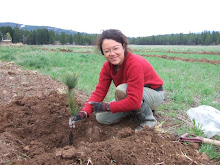This weekend I attended a draft horse workshop at the local Fort Steele Heritage Town. I am excited to discover that meditation and mindfulness is directly applicable to successful horsemanship, even in Cowboy Boots:
Fort Steele Town invited Doc Hammil, an amazing horseman from Montana, to teach the course. (www.dochammill.com). This was the real stuff. We learned about how horses think and sense and work with humans. We learned all about harnesses and the hardware, collars, buckles, straps, shanks, lines... and of course safety, and the importance of training and consistency with horses on the ground. Then we were thrown into wagons and given the reins. This was real mountain learning, thrown in the deep end! Most people there were very experienced horse people. (unlike me) I got the sense that this kind of teaching wouldn't have happened in Vancouver or New York. - it didn't hold your hand like a baby, you got thrown right in with the horses, and you had to get brave and swim with it - like people traditionally learned on farms.
Natural Horsemanship:
Doc uses the techniques of Natural Horsemanship - which emphasises communication and understanding with your horse rather than aggression. Having just read a great book about natural horsemanship,"The man who listens to horses" by Monty Roberts, I was very excited when Doc started describing similar techniques.
You've got to be a kind, gentle but firm boss to gain the horse's respect and obedience. If you're too soft, the horse will try to push you around, and thats where it gets physically dangerous. If you're too hard, you may be a short term victor by aggression and domination but you 'break' any enthusiasm and eagerness a horse would also naturally have to work for their herd leader (you). You will also probably create a whole whack of neurosis and fear around humans.
If you gain a horse's respect, then they trust that you are their herd leader and are looking out for them. Then they're willing to work and willing to ignore or have equanimity toward all the things we do to them that are naturally frightening. Doc described how our human behaviour is very predator like - we walk in direct straight lines, we smell like meat eaters, we're aggressive. Furthermore, the natural predators of horses are wild cats and dogs: Cats would pounce on their back (just like a saddle and rider), while wild dogs would nip at them from behind (just like a work plow or wagon). So the fact that a horse can ignore its natural flight instinct in the face of potential threat, i find wonderous - as if they were eager meditators, or disciples of their trusted human teacher, they are willing and able to learn to overcome their conditioning, their habitual patterns and instincts!
I now feel a new sense of wonder toward animals....
We worked with over 6 of Fort Steele's beautiful Clydesdale horses, and the diverse array of wagons and farm equipment they have there. We used a walk behind single bottom plow, as watched how a set of horse drawn discs are used. Some of the old timers there described how they could plow 5 acres a day with a team of four horses. We heard about all the 'wrecks' and tragic horse accidents - there is a lot of potential for disaster, mostly due to our human tendencies to lose concentration, focus and attention to the details of what is happening moment to moment with the horses, equipment, terrain, and our own emotions.
Doc's message: When you're calm, horses are calm. Remain emotionally neutral, no matter what happens. Visualise success and perfection with no attachment to the outcome.
Finally, a quote from one of Doc's old mentors (likely a cowboy boot wearing zen master):
"Life isn't free. You have to pay attention"
and so...the Zen of Horses

(PS> Clear Sky is at the end of the last mountain of the range above!)



No comments:
Post a Comment